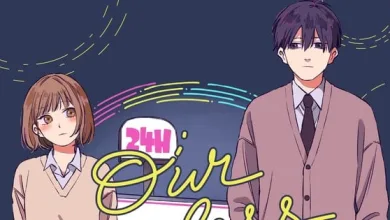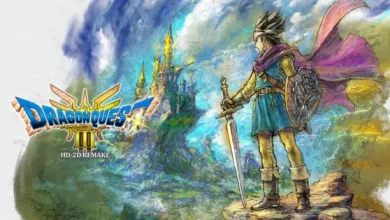Rising Impact Season 1 Anime Series Review – Review

While it can be hard to gauge how well anime generally performs on Netflix, if there’s one series that’s undoubtedly been a success for them, it’s Nakaba Suzuki‘s The Seven Deadly Sins. So much so that they’ve been consistently picking up each new season, and even its recent sequel spin-off The Four Knights of the Apocalypse, since they seem to be on the verge of running out of new 7DS material to adapt, it makes sense to start digging through the rest of Suzuki’s catalog, and that brings us to Rising Impact. This golf series ran in Shonen Jump from 1998 to 2002 and has the distinction of being a manga that was canceled early on its run and later brought back, giving it a bit of an interesting history. While I fell off pretty hard with The Seven Deadly Sins since each subsequent season saw diminishing returns in terms of both writing and production values, I was at least curious to see what this series was about since this was both much earlier in his career and published in a different magazine than his most well-known hit, meaning there’d likely be at least a few differences in tone and style. Was this series worth adapting after all these years?
Unfortunately, the show doesn’t make a great first impression as its first few episodes are easily its weakest. The show introduces us to the protagonist Gawain, a young boy from the countryside who dreams of being known as the person who can hit the ball the farthest in a given sport. Eventually, he takes up golf after meeting a professional golfer named Kiria, who takes him under her wing. Shortly after, he finds a rival in another boy named Lancelot, a master at putting and considered the greatest golfer of their generation, so Gawain makes it his goal to defeat him. It’s a pretty standard setup for a shonen sports anime, but Gawain’s motivations come off as more than a little generic at the start. While simply wanting to be the best at something because it sounds cool does at least fit with his age, it takes a while to get behind him as he largely comes off as obnoxious, especially in the first few episodes where he has fewer characters to bounce off of. It doesn’t help that the earliest parts of the show are held down by some somewhat dated humor consisting of things like Kiria constantly hitting Gawain over the head for being obnoxious, to her sister somehow mistaking Gawain for Kiria’s boyfriend when Gawain’s just a little kid (that Kiria looks like a dead ringer for Misato from Neon Genesis Evangelion makes this feel especially cursed) and running with that for the rest of the show.
Luckily, the show picks up a bit when the stage shifts to Gawain, who is sent to a school for elite golfers named Camelot Academy to compete in their annual Camelot Cup to determine the best junior golfer in the world. From there, the show gains momentum as Gawain works to improve his standing in the academy. While it’s not quite as over the top as last year’s Birdie Wing, it does a good job of leaning into the heightened reality of shonen sports anime and crafts some super elaborate golf courses alongside each new golfer possessing golfing superpower ranging from back-twisting drive shots, to seeing the path to the hole as black serpents. It all makes for a pretty fun time while also making it easier to root for Gawain as he overcomes new challenges and learns to improve his skills at golf beyond just hitting the ball as far as possible.
Of course, any shonen sports series ultimately lives or dies by the strength of its ensemble cast, and it’s here where Rising Impact struggles the most. Some of the characters are pretty likable, such as Yumiko, a golfer girl whose confidence in her skills sometimes veers into overconfidence, or Libel, an extremely skilled golfer who has trouble performing in tournaments due to cheating in the past and feeling like he no longer deserves to win, a lot of the supporting cast comes off as a bit underdeveloped. Most are introduced as antagonistic towards Gawain for no reason other than his age, and even those with a bit more to do than that suffer from a lack of fleshed-out motivations. The worst victim of this is probably Lancelot, who is introduced as having a sister named Kejury, who was once a legendary golfer in her own right before suffering visual impairment that’s left her unable to play unless she goes through with surgery. This ultimately leads him to the decision to stay with her until her sight is healed instead of following Gawain to Camelot Academy. While that seems like it would make for an interesting bit of backstory since Kejury seemed to be pretty close to Kiria during the height of her career, her eyesight is healed well before we learn more about her. Hence, in execution, it all just comes off as a way to write Lancelot out of the series for a while before having him join the school anyway and bring him back for the big tournament. It’s not enough to bog down the show’s momentum, but it also doesn’t leave the show standing beyond all the spectacle.
In terms of production quality, the show looks pretty solid. The animation team at Lay-duce does a good job of leaning into all the over-the-top golf theatrics and goofy character reactions without any notable issues. The show also has a solid English dub as it stars Debi Derryberry (probably best known among millennials for being the voice of Nickelodeon‘s Jimmy Neutron and Zatch in the Zatch Bell dub that used to air on Toonami) in her first starring anime role since playing the lead Cure…er…” Glitter” in Glitter Force Doki Doki. While this doesn’t have quite the same novelty as Magical Girl Jimmy Neutron, she delivers a pretty fun performance as Gawain. She does an excellent job of making him off as a goofy little kid in a way that generally manages to be charming rather than annoying. The dub also features some accent work for a few of the British characters, such as Lancelot or Aria, who takes over as one of Gawain’s instructors, and Kieran Regan and Courtenay Taylor do a good enough job with them that it helps to add to their performances rather than feel distracting, and given how tricky accent work can be, it’s always nice whenever it’s handled well.
I walked away from the first half of this series feeling reasonably entertained despite a rough start; it eventually managed to veer into something fun, if a bit uninspired. Still, its shortcomings are pretty hefty, and between some of its issues with its writing and its underdeveloped cast, it’s not too hard to see why this series didn’t carve out much of a legacy in Shonen Jump. I am at least still curious about where the series is going. While I’m not expecting things to change too dramatically, there’s at least enough potential to keep me interested for the rest of the story. In the meantime, though, while you can certainly do much worse for a shonen sports show, I’m not sure how strongly I can recommend this to anyone who isn’t already a diehard fan of Nakaba Suzuki‘s work.
Source link
#Rising #Impact #Season #Anime #Series #Review #Review


